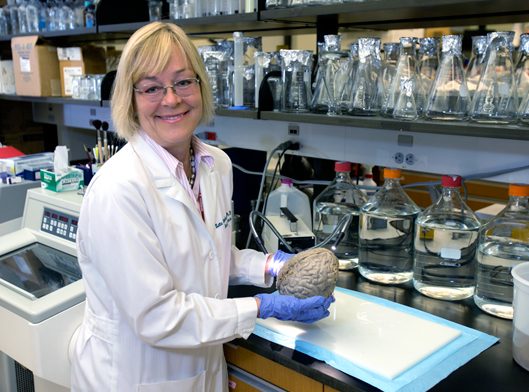Dr. Granholm-Bentley is the executive director of the Knoebel Institute for Healthy Aging, which is located on the fifth floor of the newly opened Daniel Felix Ritchie School of Engineering and Computer Science building at DU. In a Q&A session, Dr. Granholm-Bentley explained her vision for the institute, outlining possible opportunities for student involvement.
Q: Before this, you were working in the Center for Aging in South Carolina. What kind of work where you doing there?
A: I was working in a medical school as the director for the Center on Aging. We called ourselves interdisciplinary so it included nursing, physicians and dentists. I wrote grants and put people together into teams.
Q: What made you come to Colorado?
A: I lived here a long time before the institute. I came here from Sweden in the 80s as a postdoc and I was going to stay one year and then just stayed.
Q: How was the project started?
A: It actually started about 10 years ago with visionary Lynn Taussig. He was hired as a special advisor to the provost to increase life sciences on campus. There was one thing that he thought of that would be interdisciplinary and touch on all areas of DU. In 2012, they started giving out pilot grants so that people would start work in interdisciplinary teams.
Q: Healthy aging can mean many things to different people. What does healthy aging mean to you?
A: It’s funny because this is a question we ask to everyone everywhere. To me, healthy aging means you can do what you want. Whatever that person’s wants or needs are, that’s healthy aging.
Q: Where do you see elderly individuals having the most hinderances in wanting to do things but not being able to?
A: There are several things. Transportation is a huge issue. Access to care is another huge issue. There are many parts of our state that don’t have access to care. If you don’t have access to care, you don’t get better and you don’t get the right kind of support from health care.
Q: What are the institute’s major goals and objectives?
A: Our vision is quality in life, wellness and community. That kind of says it all. We work within DU, all colleges and schools. We will then work beyond DU. We will work with community organizations, with government, with nonprofits and with other institutions to enhance research in aging, enhance attitudes about aging and change policies.
Q: Are you currently working with other departments here at DU? For example, the Sturm College of Law?
A: We want to work with law but we haven’t done that yet. They don’t have a program for that. I met with the new dean and he expressed an interest in that and he think that will happen. Hospitality and aging is very big, so we really hope to work with hospitality. We want to work on intergenerational housing projects, to work on elder living facilities, to work on restaurant food and aging. The whole overall vision is that we want to play a big role in community and in Colorado to advise and move people forward. Another important thing for us is workforce development. Most jobs that will become available will have something to do with the aging field.
Q: How are you looking to connect to the broader community? Have you partnered with any community organizations?
A: We have been in existence for about a year, formally. We have a relationship with the Colorado Neurological Institute (CNI). Because of that, CNI has put more than 50 DU students into internships with different companies and practices. We also work with the Alzheimer’s Association and have started an art project with DU students working with people with dementia. It’s called Memories in the Making.
Q: What exactly are they doing with that project [Memories in the Making]?
A: It just started. They go to a living facility that has a dementia living unit. One thing that we know that is really effective for people with dementia is art therapy, so the DU students and patients paint together like a joint project. It’s a mix of undergraduate and graduate students, so anyone who is interested can do it.
Q: Where do you see the future of this kind of work going? Will it expand?
A: I’ve only been here since Aug. 1 and it’s amazing how people are coming together. It’s expanding because Colorado is a very inclusive state compared to other states. The government in Colorado is actually interested in making a difference.
Q: How do you hope to shape the conversation on attitudes and policies that relate to healthy aging?
A: Simply by asking. At DU, we have so many experts in so many different fields. By putting together teams that are prepared to do this, we have the knowledge base.











